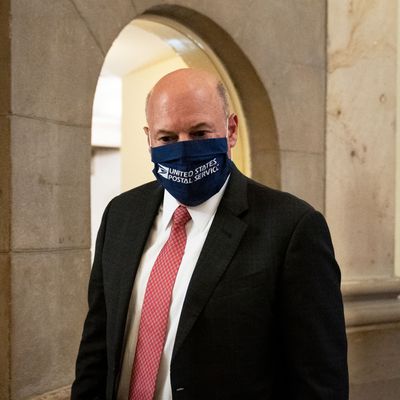
Over the past few weeks, farmers in Maine have received thousands of dead chickens in the mail. The culprit isn’t Armageddon or disease, Representative Chellie Pingree told the Portland Press Herald, but rather dysfunction within the U.S. Postal Service. “It’s one more of the consequences of this disorganization, this sort of chaos they’ve created at the post office and nobody thought through when they were thinking of slowing down the mail,” she said. The Postal Service has shipped live chicks since 1918, a process that isn’t usually as risky as it sounds.
But, lately, those processes have changed. The mail is piling up — and so are the chicken corpses. People aren’t getting vital medicines, bill and rent payments are delayed, and postal workers are struggling to keep a vast public institution afloat. On Friday, Postmaster General Louis DeJoy had a chance to explain why, but he didn’t have much to say for himself. DeJoy claimed he wasn’t aware that mail-sorting equipment and mailboxes were being removed until it happened. He said that any mail delays would be temporary — and that they were merely the result of trying to make the mail more efficient.
Throughout the hearing, DeJoy appeared defensive — not only of his policy changes but of his job performance as well. “There are some accusations that [USPS] is not a business, but when you have to deliver service and you have to be sustainable, the operating model has to cover costs, and we have to take actions to do that, and I have great experience at that,” he said.
DeJoy’s account of his own qualifications directly contradicts testimony from a former member of the USPS Board of Governors. At an ad-hoc hearing organized by the Congressional Progressive Caucus on Thursday, David Williams told representatives that DeJoy did not distinguish himself during interviews for the job. Republican John Barger, who nominated DeJoy, “helped [DeJoy] finish a number of sentences where he got stuck and in addition to that [Barger] explained to the board what Mr. DeJoy meant during the presentation,” Williams said. DeJoy also never underwent a background check, and he maintains some investments in companies that are direct competitors with the USPS.
Treasury Secretary Steven Mnuchin also exercised a great deal of control over the USPS’s Board of Governors. As Slate reported on Thursday, Williams testified that candidates for the board had to go to Mnuchin’s office “to kiss the ring and receive his blessing before confirmation.” Though Mnuchin told Senate Minority Leader Chuck Schumer in a letter that he was “surprised to learn” that DeJoy — a major Republican donor who had founded his own logistics company — was a candidate for postmaster general, DeJoy’s early policy changes reflected the changes that Mnuchin desired to see at the USPS, as David Dayen noted for The American Prospect.
On Friday, DeJoy stuck to the same script he’s used since the slowdown first garnered national attention. He blamed delays on COVID-19, an excuse which would seem to fail a basic logic test: As Senator Gary Peters of Michigan noted, the virus has been around since March and the slowdown began months later. Under a pointed series of questions from Senator Jacky Rosen of Nevada, DeJoy faltered; he either could not or would not provide detailed answers about the internal analyses upon which his policy decisions were based. DeJoy also reiterated an earlier refusal to replace the sorting machines that the USPS had already removed and claimed that he hasn’t reduced overtime for workers. Unions and individual postal workers uniformly dispute these claims and blame DeJoy’s changes for contributing to overall mail delays.
DeJoy did tell senators that the USPS would process all ballots as first-class mail regardless of how they were posted, which is a reversal:
The House will have an opportunity to get more useful information out of DeJoy on Monday, when he’s scheduled to appear before the House Oversight Committee. For now, he appears committed to maintaining the policies responsible for the slowdown. Once the election is over, he said, there will be more cuts — and, presumably, more dead chickens.






























